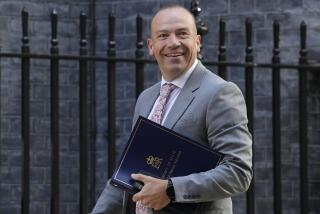More British Troops Deploy in Belfast
- Share via
LONDON — Alarmed at a surge of sectarian killings, officials in Northern Ireland on Friday ordered more British army troops into the streets of Belfast to guard against spiraling violence.
The action followed three slayings in a week by splinter groups of Protestant and Roman Catholic militants and came amid growing fear that mainstream loyalists and republican paramilitaries will be sucked into terrorism that could destroy already fragile peace hopes.
“The situation is now serious, but it is not out of control,” said Marjorie “Mo” Mowlam, the British Cabinet minister responsible for the province that has been bloodied by three decades of sectarian hatred.
Police said that patrols by flak-jacketed officers in armored cars will be significantly increased in Belfast, the provincial capital, and that soldiers will reinforce them in sensitive areas during daytime.
Soldiers with automatic weapons dodging through the streets are part of Belfast’s folklore.
In recent months, though, the British government had reduced the military presence in Northern Ireland as a gesture of support for the peace process.
On Friday, battle-dressed troops patrolled key intersections, where Protestant and Catholic communities abut, for the first time since a cease-fire was declared by the outlawed Irish Republican Army in July.
At direct risk are peace talks led by former U.S. Senate Majority Leader George J. Mitchell, which have plodded along since September with no sign of any breakthrough.
Key unionist parties that speak for the Protestant majority have so far refused to engage directly with Sinn Fein, the legal political wing of the outlawed IRA.
“Despite the pressures being exerted on the peace process, Sinn Fein will not be deflected from our commitment to a negotiated settlement,” party Chairman Mitchell McLaughlin said.
The ominous spate of violence began last Saturday, when members of a radical republican splinter group killed loyalist terrorist Billy Wright, known as “King Rat,” inside Belfast’s supposedly high-security Maze prison. Three imprisoned members of the small, extremist Irish National Liberation Army are accused of murder.
Seeking to avenge their leader’s death, members of Wright’s equally small and extreme Loyalist Volunteer Force, or LVF, gunned down doorman Seamus Dillon, 45, and wounded three other Catholics outside a rural hotel that same night.
On New Year’s Eve, LVF gunmen opened fire outside a Catholic pub in Belfast, killing 31-year-old Eddie Trainor and wounding five other Catholics.
A well-known political adage for both sides in Northern Ireland says: “Get your retaliation in first.”
Hard-liners within the IRA and in some of the loyalist paramilitary groups are known to be suspicious of the talks and restive at the political initiative, favoring a return to violence.
Thus there is fear that the situation could spin out of control if there are new attacks this weekend.
“This is not the end,” according to a statement by the LVF, whose trademark is wanton violence.
In the New Year’s Eve attack, bar patrons toppled tables in a panicked rush to evade two gunmen who burst into the pub in the Catholic Cliftonville area of north Belfast three hours before 1997 ended.
Cliftonville, which is surrounded by poor Protestant neighborhoods, is the bloodiest piece of Belfast: More than 500 of the 3,200 people killed in the sectarian violence since 1969 have died there.
So far, cease-fires by mainline Protestant and Catholic paramilitaries have held, although some suspect that these groups have given at least tacit support to the splinter groups’ actions.
“In an atmosphere of such increased tension, there has to be the real risk that others will be sucked in,” Northern Ireland Chief Constable Ronnie Flanagan said.
David Trimble, leader of the Ulster Unionist Party, told Mowlam in a contentious meeting that there is a “complete absence of confidence in her” in the unionist community.
Northern Ireland’s unionists want the province kept under British rule, while republicans want it to rejoin the Irish Republic.
Amid the tensions, about 160 paramilitary members from both sides who had been paroled for the holidays returned without incident to the Maze prison Friday.
More to Read
Sign up for Essential California
The most important California stories and recommendations in your inbox every morning.
You may occasionally receive promotional content from the Los Angeles Times.










